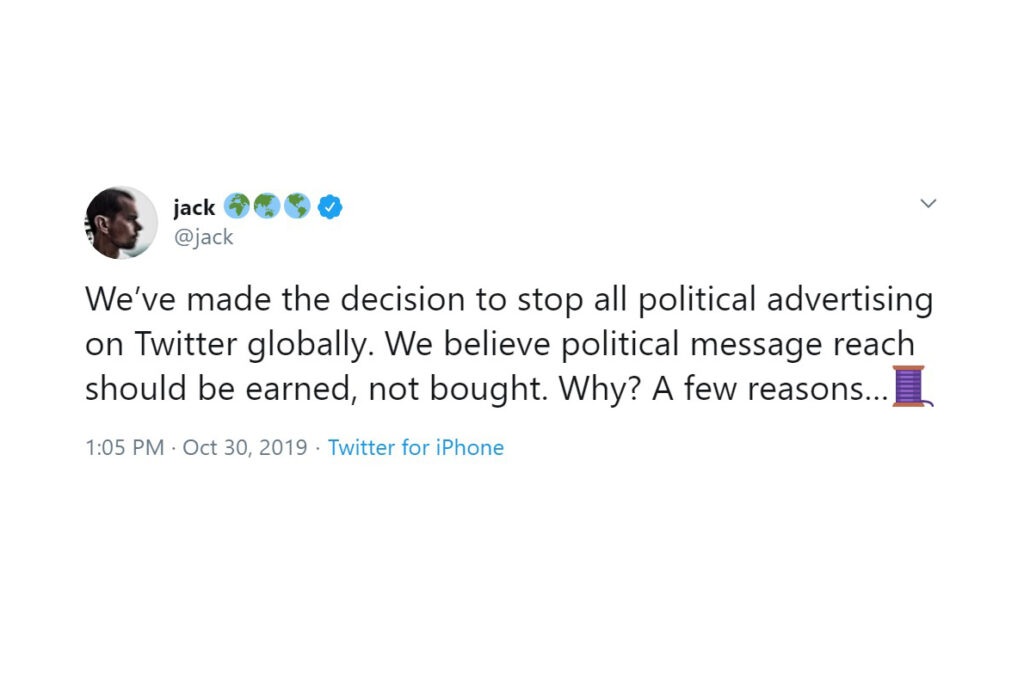Facebook ads are targeted lies. Should it ban political ads as Twitter did?

Twitter CEO Jack Dorsey just banned all political and issue advertising. Facebook currently accepts all political ads, even if they include false content. But rather than blindly follow Twitter’s lead, I think Facebook has to think a little harder.
The current situation regarding Facebook advertising for candidates is unacceptable. Mark Zuckerberg says it’s a free-speech issue. But the result will be a stream of lies and counter-lies, filed by candidates and their surrogates, generating mass confusion about candidates and their true positions. The simplest thing to do is to shut it all down, as Twitter has.
Facebook should do that . . . for now.
But that solution has flaws, too. Consider how Twitter legal and policy lead Vijaya Gadde explained what “political” means to Twitter’s advertising policy:
So climate change, tax policy, and health care groups can no longer contribute to the political discourse. This is a sad side effect of banning corrosive political advertising.
Before social media, candidates flooded the airwaves with ads, and the biggest budgets ruled the discourse. Sites like Facebook created a more level playing field. It’s would be a shame to lose that quality.
What we need is a more enlightened policy.
Let’s design a Facebook political ad policy that works
The challenge with Facebook political ads is that they can be targeted lies.
A candidate can create one set of false claims intended to appeal to conservatives and another set intended to appeal to liberals — or different ads for different people based on age and gender. This targeting, combined with Zuckerberg’s policy that lies are permissible, encourages the worst type of advertising, appealing to our basest natures. Even if you like a candidate, you’re only going to see what she shows you, not what she shows people unlike you — which may be outrageous and pernicious.
So the first step in improving Facebook’s policy for political ads is to ban most targeting. A political or issue campaign must show the same ad to everyone. Geographical targeting has to remain (a candidate in Utah doesn’t want to waste money showing ads to people in Georgia), but we can still enforce a policy that while ads can be restricted to a geography, all the ads within that geography must be the same.
That’s leaves the harder policy: banning lies.
The solution here lies in Facebook’s new Facebook News tab, where news sources that publish false content will be banned. Facebook is willing to invest in verification of content here, unlike in ads, because the problem is tractable: there will be hundreds, not millions, of news sources.
Based on this, we can create a policy for political ads. Political ads contain claims. Each claim must be documented by a news source in Facebook News — in news, as opposed to opinion. Anyone in the public (including an opposing candidate) must have the right to see and challenge those claims.
This source citation and review process will take work. But it is the only way, short of banning political and issue ads completely and forever, to bring Facebook back from the brink. I’d rather that my social media didn’t devolve into a toxic stew of paid-for lies, targeted specifically to inflame me and make me hate politicians. Fix this, Facebook. You have the skill and the power to do it. Do you have the moral courage as well?
Perhaps we should start some “political ads” on Facebook with messages like
‘Facebook gives you cancer’
‘Did you know Facebook is spying on your kids’
‘Facebook can read your emails and sell data to the Russians’
‘Facebook is backed by the KKK”
Perhaps then they might understand what is wrong with false advertising.
Benjamin,
I like your reply. It is so easy to spread lies and so difficult to uncover the truth.
Josh you say: “So climate change, tax policy, and health care groups can no longer contribute to the political discourse. This is a sad side effect of banning corrosive political advertising.”
But doesn’t the ban only impact advertising? So a climate change, tax policy, or health care group can contribute to the political discourse through normal tweets can’t they?
Of course, anyone can tweet anything. But I think those groups should be able to advertise, too.
GOOD POST . . . I”m glad somebody else has noticed a change in the Facebook ads . . . they’ll sell to anyone, and I don’t think there’s anyone actually watching the store — or else they don’t look at something until someone complains about it.
Back in May, I wrote this about Facebook’s “China Dates” ads . . . https://medium.com/facebookwatch/so-now-we-know-why-facebook-has-been-pushing-the-sex-trade-1480e7eed6c0
Just read this Josh.
Taking your idea further. If the opposing political party (or anyone else) can verify than an ad is fake/false, should Facebook then apply a penalty to that advert?
Not a financial penalty. Instead Facebook would change the ad with a big, red, ‘THIS IS FALSE’ message. Then Facebook would show the ad at least 10 times to everyone who got the original. Plus everyone else in the geography the ad targets.